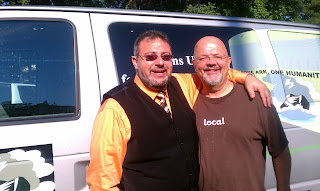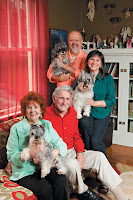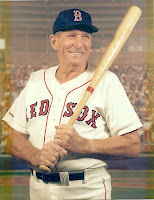Tuesday morning I went to work late so I could cook breakfast for a meeting with Clergy Beyond Borders who were meeting at our church as a part of their national tour. I made Blackberry French Toast and Figs Stuffed with Goat Cheese. And then I sat down to eat around a table of people of faith in God and in one another. There were three imams, two rabbis, a Fransiscan priest, some Protestant ministers, a couple of Unitarian-Universalist ministers, and some non-minister types as well. We ate and we talked.
As we talked, I realized I had been unwittingly prepared for the encounter by my friend Terry Allebaugh, whom I’ve mentioned before as the best harmonica player I have ever heard and who also is the founder and director of Housing for New Hope, an organization committed to ending homelessness in Durham. After our inter-faith service on September 11, he commented that he was moved to think that people were going two directions on that day: some were running away from the burning buildings and others were running into them to see whom they could save. Then he went on to say he wondered sometimes which way he would have run had he been in New York that day. “Then again,” he said, “it’s a live question everyday: which direction am I going? Depending on the day, it could go either way.”
Between Sunday and Tuesday, Terry’s words haunted me – and sent my mind and heart on meaningful sojourns. First, I thought of Jesus’ admonitions about the wide and narrow ways, and how few found the narrow way. Perhaps, I thought, the narrow may might be the road running toward. As we went around the table at the breakfast and those who were a part of CBB shared their experiences, they talked about taking time to listen to one another’s stories and to eat together – yet another narrow road. Taking time to listen doesn’t make most schedules these days.
Then I thought of the words of one of my favorite theologians, George Carlin, who had a great routine (that I was unable to find on Youtube) built around the idea that we as humans only do two basic things: we go out and then we come back.
We run away and we run into.
At the breakfast, they passed around a sheet with the “30 Commandments of Inter-Religious Dialogue” listed, which was written by Imam Yahya Hendi, “reflecting on fifteen years of experience in inter-religious dialogue.” The list was brilliant.
5. Thou shall never apologized for what is authentic in your own tradition.
8. Thou shall be quick to apologize and slow to take offense. And never too arrogant to say, “I am sorry.”
10. Thou shall accept the passion which others bring to the dialogue.
17. Thou shall not belittle nor misinterpret a smile.
20. Thou shall be inclusive in your language and actions.
21. Thou shall be patient.
24. Thou shall be courageous.
25. Thou shall be compassionate.
And then there was Number 26: Thou shall have hope.
When it was my turn to speak, I pointed to Number 26 to say it was a beautiful and difficult commandment. I said there, as I did in my last post, that fear had become the primary American value, which made listening of little value. We know how to run to opposite polls and yell at each other. To have hope is both crucial and difficult.
Imam Hendi listened well and responded by telling his story.
 |
| Imam Hendi and me |
“My background is Palestinian,” he said. “If you look closely, you can see this scar on my face.” Under his mustache was a thin line that ran from his lip into his cheek. “When I was seven, I was beaten by several Israeli soldiers. I am now forty-five and I still don’t know why. But I made a choice after that beating to learn about those who had hurt me. So I learned Hebrew and I learned about Judaism and I learned how to talk to them. I have hope.”
“I do, too,” I answered. “I am just struck as we sit here at how utterly futile it seems in the face of everything that is happening. And how much it matters that we commit our lives to fail boldly in God’s name, to have faith in God and in one another.”
The most profound way we can set our lives to run into – to run toward – is to run toward each other. As I write that sentence, I realize it feels easier to run toward the inter-religious dialogue than an intra-Christian discussion sometimes. I see many of those with whom I share a Baptist heritage whose pain and hurt has led them to see faith and the church as something to grow out of, or grow beyond, or run away from. I pray that is not the final direction they choose.
Deuteronomy 28:6 says, “Blessed shall you be when you come in, and blessed shall you be when you go out” – a benediction for both directions of our lives, for, as Terry says, on any given day we don’t know which way we will be moving. And, as George Carlin says, it’s always one or the other. Whichever the direction, may it be with intention, courage, and hope.
I close with the benediction from our service at Pilgrim last Sunday:
Leader: May the Lord bless you and keep you.
People: May God’s face shine upon you and may God be gracious to you.
Leader: May God give you grace this day never to sell yourself short.
People: Grace to risk something big for something good.
Leader: Grace to remember that the world is now to dangerous for anything but truth.
People: And too small for anything but love.
Peace,
Milton



